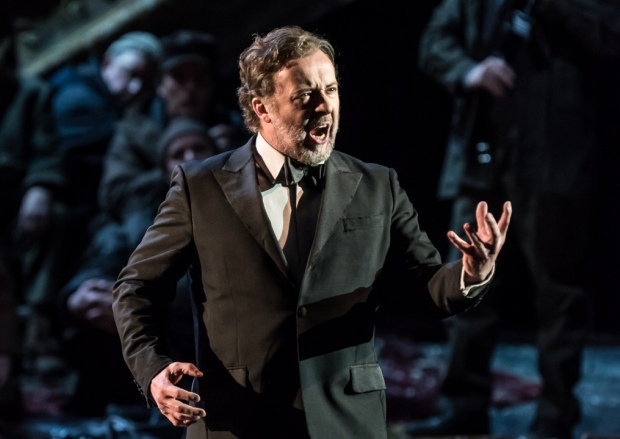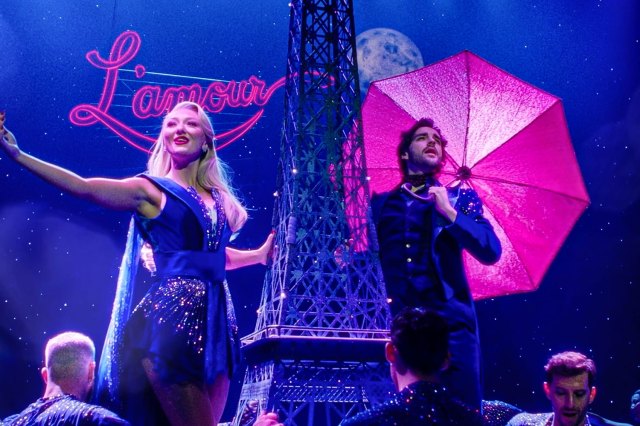Tannhäuser (Royal Opera House)
Tim Albery’s staging of Wagner’s opera returns, finely conducted but unevenly cast

© Clive Barda
This is the show where heaven is a bedroom and hell is other people. Six years on from its opening, Tim Albery's inverted concept of Tannhäuser, a pivotal opera that touches on several of its composer's future preoccupations (netherworlds, celestial redemption, song contests…), is still more subversive than it looks. But he had to do something with one of the silliest plots in opera; one, moreover, that Wagner packaged in three and a half hours of solemnity. Not including the intervals.
Tannhäuser leaves home and embarks upon a torrid affair with the goddess Venus. As you do. Eventually he tires of fleshly pursuits and longs for homespun mortality, so he heads back to earth and takes part in a singing competition. Everyone is horrified when his song extols new-learnt joys of carnality; they vilify the prodigal and expel him with death threats, whereupon he goes to the Pope to seek absolution.
Michael Levine's designs set Venusberg behind a proscenium arch beyond the proscenium arch – an exact replica of the Royal Opera House's crimson-and-gold front curtain. The inviting drapes promise hidden delights; the solid frame keeps us out. It's a tease. In the later acts, back on earth, this sexy sumptuousness has crumbled into a monochrome wasteland; by the end it's a nuclear winter. So much for virtue.
Unfortunately, having dealt the trump card to lust, Albery muffs the payoff. His Venusberg dancers (this is the 1875 version of Tannhäuser, so there's a ballet) do little more in Jasmin Vardimon's sexless choreography than cross-country running and handsprings. At least they remembered their kit. Where's the sensuality? No wonder Tannhäuser's losing interest in the lurve thing – or perhaps that's Albery's point.
'Moment of the year'
Back on earth that singing competition, overseen by the sterling bass of Stephen Milling as Landgrave Herrmann, unfolds against a grim backdrop of Kalashnikov-toting chorus-members. How times change: since the production's first outing in 2010 this image has become one of opera's direst clichés. Albery is saying that fundamentalism takes many forms, but it's blatant stuff (although the Royal Opera Chorus, happily, is on rousing form).
Tannhäuser is perhaps the most melodic of all Wagner's operas, and in Hartmut Haenchen it has the ideal conductor. Ever attentive to ebb and flow, he conducts the music's textures as surely as its colours. There's nothing stark about his cohesive reading: the ROH Orchestra glows with chiaroscuro moodiness, while his support of Christian Gerhaher's poetically beautiful timbre in act three is likely to be my moment of the year.
Gerhaher deservedly won an Olivier Award for his singing of Wolfram when the production opened. His performance is no less imposing here. If anything, that smooth voice has grown in the interim; he certainly has the full Wagnerian belt at his command now, even though he keeps a lid on it most of the time. As a Lieder specialist the German baritone chooses his operas sparingly, but his gifts and skill are prodigious.
Sadly, Peter Seiffert is no longer the tenor he once was – on this showing, at least – and the relentlessness of Wagner's title role told on opening night as he struggled with tempo and his voice, forthright but tight, only just held until the end. The Venus of Sophie Koch was another disappointment, her normally alluring mezzo showing signs of wear. Emma Bell, by contrast, was a revelation as the blessed Elisabeth, virtuous to the last and ever true to the errant Tannhäuser. The British soprano found real tenderness within the music – and that, given Wagner's bluff palette, is no small achievement.
Tannhäuser continues in repertory at the Royal Opera House until 15 May.












